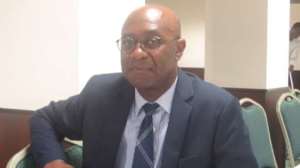
The Ghana Revenue Authority (GRA), has called for a strong collaboration between academia and industry to help address the menace of Illicit Financial Flows (IFFs) in the country.
Mr Henry Yentumi, the Technical Adviser to the Commissioner General of the GRA, said it was very important to have collaboration between industry and academia, especially in relation to evidence-based research.
He said research findings should actually rely on data that had been independently collected and analysed by academic institutions; stating that good research findings would go a long way to inform quality policy formulation.
Mr Yentumi made these remarks, on Thursday, in an interview with the Ghana News Agency on the side-lines of the launch of an academic research project dubbed: 'Curbing Illicit Financial Flows (IFFs) from Resource-rich Developing Countries: Improving Natural Resource Governance to Finance the Sustainable Development Goals (SDGs)'.
Mr Yentumi said IFFs was a major issue for most developing countries including Ghana; declaring that in tackling it, there was a need for exchange of information between various tax jurisdictions.
According the Global Financial Integrity (GFI), IFFs are illegal movements of money or capital from one country to another.
GFI classifies this movement as an illicit flow when the funds are illegally earned, transferred, and/or utilized.
He said various countries including Ghana, had signed up to regulations and laws that would enable them exchange information.
The was the need, he said, to build capacity in respect of auditing, particularly, in specific areas such as the extractive industry and oil and gas, as well as mining, being key.
'We need to ensure that our data is reliable, our valuation and classification data is also one that has the integrity and, of course, there is a collaboration with international organisations like the International Monetary Fund (IMF), Organisation for Economic Co-operation and Development (OECD) and other jurisdictions like the Tax Inspectors Without Boarders; so that we can ensure that we employ best practice in detecting, as well as taking actions to sanction any culprit who fall foul of the laws or regulations,' he stated.
Mr Yentumi said IFFs was one identified risk in respect of their revenue performance; and they were tackling it with all their resources.
He noted that applying sanctions was important in curbing IFFs; stating that detection in all forms, including exchange of information with relevant agencies.
Additionally, using automated approaches to make sure that their detection systems were good, regulating extractive sectors better and taking actions to ensure there was a deterrent was important for people to know they would be found out if they engaged in such illegal transactions.
He said the workshop was timely, giving the magnitude and its impact on the nation's natural resources; 'if we are to move beyond aid'.
The project is being organised by ISSER in collaboration with the Centre on Conflict, Development and Peacebuilding (CCDP) of the Graduate Institute of International and Development Studies (GIIDS), Geneva, Switzerland
It is a three-year project being funded by the Swiss Programme for Research on Global Issues for Development (r4d programme), a joint initiative of the Swiss Agency for Development and Cooperation (SDC) and the Swiss National Science Foundation (SNSF).
The objectives of the project are mainly to analyse the magnitude and push-pull factors influencing commodity trade-related illicit financial flows via trade and transfer mispricing from resource-rich developing countries like Ghana.
On that basis, this project will aim to design and promote strategies to effectively harness resources for financing the sustainable development goals (SDGs).




 We’re disappointed over gov’t’s lacklustre attitude to negotiations of our condi...
We’re disappointed over gov’t’s lacklustre attitude to negotiations of our condi...
 No more Buffer Stock as Mahama promises to decentralise SHS food supply
No more Buffer Stock as Mahama promises to decentralise SHS food supply
 NSS urges President Akufo-Addo to sign National Service Bill into law
NSS urges President Akufo-Addo to sign National Service Bill into law
 You're lying, your 7-11pm dumsor attributed to overloaded transformers is false ...
You're lying, your 7-11pm dumsor attributed to overloaded transformers is false ...
 Consult Council of State on anti-gay bill – Mahama advises Akufo-Addo
Consult Council of State on anti-gay bill – Mahama advises Akufo-Addo
 Transport Ministry has no power to determine fares – COPEC
Transport Ministry has no power to determine fares – COPEC
 Brace yourselves for more economic hardship – Prof Adei to Ghanaians
Brace yourselves for more economic hardship – Prof Adei to Ghanaians
 Any government depending on IMF is likely to fail – Grand Coalition
Any government depending on IMF is likely to fail – Grand Coalition
 Ghana risks losing premium cocoa position due to galamsey – COCOBOD laments
Ghana risks losing premium cocoa position due to galamsey – COCOBOD laments
 Akufo-Addo launches NSS policy document to tackle under-utilisation of service p...
Akufo-Addo launches NSS policy document to tackle under-utilisation of service p...
